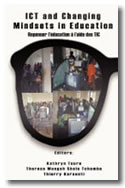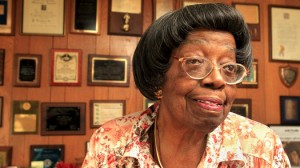We’ve come a long way, but there’s a long way to go May 20, 2013
Julia Hill didn’t have to think long about what the next 50 years might hold for civil rights in America.
“I’ll be gone,” she said, when I questioned her. “But I’m going to pray for you.”
The audience at the Plaza branch of the Kansas City Public Library laughed. The group had gathered to honor the 90-year-old Hill, and everyone knew that in addition to praying, she had confronted racism and injustice with uncommon courage. Her quest included 60 years with the National Association for the Advancement of Colored People, serving as president from 1971 to 1980. The civil rights pioneer and former president of the Kansas City school board announced in January she was stepping down as an executive board member of the local NAACP.
“I think the NAACP is a fine organization, and it’s still needed,” Hill said. “We still need to support it. We’ve come a long way, but I think there’s a long way to go. And we’ve slipped backward. We still haven’t reached the utopia of an integrated society.”
Far from it. Hill recalled the tight restrictions of segregation confining Kansas City’s black community from Fifth to 27th streets and Campbell to Wabash avenues. But Hill, who grew up in Kansas City and later taught in the Kansas City Public Schools, also remembered how blacks felt empowered by the 1954 Supreme Court decision ending legal segregation and the success that followed the Montgomery, Ala., bus boycott.
The walls of racism that maintained the separate and unequal society were starting to weaken, and Hill in the 1950s helped wield the sledgehammer that brought down barriers in Kansas City.
“Separate is not equal,” said Hill, who joins others for this column series looking at 50 years of civil rights advances while sharing a vision for the next half-century. “You don’t know what’s happening on the other side. It can’t be equal.”
Hill and others organized pickets of downtown stores in the Christmas shopping season of 1958 after a black teacher was refused service at a lunch counter. Black people then could buy clothes downtown, but they couldn’t try them on as white shoppers did. Hill knew that through unity black people could gain the constitutional rights they deserved. The success led to Hill and others pushing for black Kansas Citians to work in stores and as drivers.
“Black men and women drive buses now,” Hill said. “Nobody is falling out or having a stroke.”
Hill and others took on Kansas City area businesses, government, schools, colleges and the news media over their biased hiring practices. They helped win jobs for African-Americans. “We had been overlooked for so long it was easy to overlook us,” she said.
Police brutality also was a problem. Advances include more black police officers and Darryl Forté as Kansas City’s first black police chief. “He’s doing an excellent job, praise the Lord,” Hill said.
Despite the Herculean civil rights work in Hill’s lifetime, racism, prejudice and discrimination remain strong. “It’s here and it’s ripe,” she said.
Hill, who holds a doctorate in education, credits her parents for pushing her to do well in school. She urged young people to equip themselves for the rocky climb against bigotry by excelling academically so they can get the jobs of the future. Full acceptance will come from “demonstrated abilities.”
She urged adults to be more engaged with young people to help get them ready for future challenges. “It goes back to it takes a community to raise a child,” Hill said.
People also have to realize that America can’t do without black people.
“We are American citizens,” Hill said. “We were born here. We were reared here. I’m never going back to Africa.”
But Hill cautioned that people have to turn away from texting, social media and cellphones and talk with others. It is the only way problems will be identified and solved. Civil rights advances in the next 50 years will only occur if everyone is involved. “We’ve got to stop thinking only of ourselves if we’re going to save this world,” Hill said.
Unity worked in the early civil rights struggle. It will be our salvation now and well into the future.
By LEWIS W. DIUGUID
The Kansas City Star
To reach Lewis W. Diuguid, call 816-234-4723 or send email to ldiuguid@kcstar.com.
Source: www.kansascity.com/2013/05/19/4242656/weve-come-a-long-way-but-theres.html




Leave a Reply